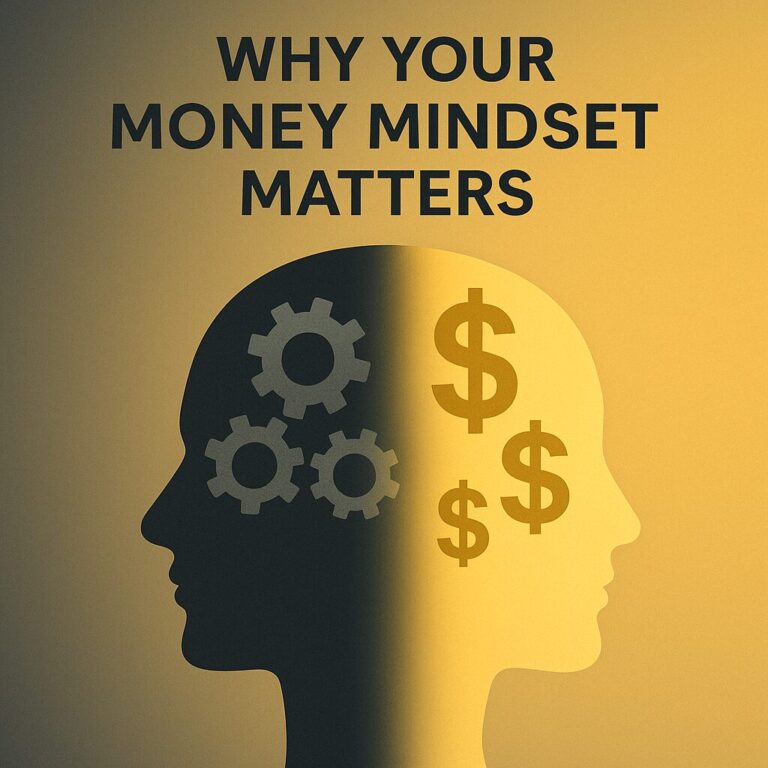The Discipline Dividend: How Self-Control Builds Lasting Wealth
When people talk about “financial freedom,” they usually picture a bigger paycheck, a lucky investment, or a once-in-a-lifetime opportunity.
But here’s the truth few want to admit:
Budgets don’t break because of math — they break because of mindset.
Financial discipline is the foundation that makes every plan work. It’s what separates people who talk about wealth from those who quietly build it.
1. The Illusion of More Money
We often think more income will fix everything — but without discipline, more money just multiplies bad habits.
- The raise that disappears into a nicer car.
- The debt payoff that’s followed by new debt.
- The budget that gets abandoned the moment convenience calls.
The truth is simple:
If you can’t manage $1,000, you won’t magically manage $10,000.
Financial success doesn’t start when your income grows — it starts when your self-control grows.
2. The Mindset of Financial Discipline
Discipline isn’t about deprivation. It’s about directing your decisions toward freedom instead of frustration.
a. Awareness — Know where every dollar goes.
You can’t control what you don’t measure. Whether it’s an app, a notebook, or a spreadsheet, track your spending. Numbers tell the story your memory forgets.
b. Restraint — Pause before the purchase.
Ask, “Does this move me closer to freedom, or just make me feel better right now?” That one question separates long-term builders from short-term buyers.
c. Consistency — Win small, win daily.
Discipline is not intensity once in a while; it’s the same small decision, repeated 100 times. The results compound over time.
3. The Discipline–Freedom Paradox
People think discipline limits freedom.
In reality, it creates it.
The person who saves 10% every month doesn’t feel trapped — they feel secure.
The person with an emergency fund sleeps better than the one chasing comfort with a credit card.
Financial discipline is how you buy back your future freedom, one decision at a time.
Control now. Options later. That’s the real trade-off.
4. The 24-Hour Rule
One of the simplest ways to practice discipline is the 24-hour rule:
- Pause. No non-essential purchase gets made the same day.
- Reflect. Why do you want it? Need, boredom, or ego?
- Decide. If it still matters tomorrow, it’s probably worth it.
This single habit can save hundreds per month — not because you can’t spend, but because you learn to decide before you do.
5. Emotional Control = Financial Control
Money decisions are rarely logical.
They’re emotional — driven by fear, status, or stress.
That’s why discipline starts in the mind, not the wallet.
Ask yourself: How will this feel in 30 days?
If the answer is regret, you already know what to do.
When you master your emotions, the rest of your financial system starts to align.
6. Daily Habits that Build Financial Discipline
| Frequency | Action | Why It Matters |
|---|---|---|
| Daily | Track your spending for 2 minutes | Awareness is control |
| Weekly | Review your zero-based budget | Catch drift early |
| Monthly | Record 3 wins & 3 leaks | Reinforce improvement |
| Quarterly | Do one “spending fast” week | Recalibrate your habits |
Each habit builds your “discipline muscle.” Like lifting weights, progress starts light — then gets stronger with repetition.
7. The Long Game: Compounding Control
Discipline compounds faster than dollars.
Every time you say no to instant gratification, you say yes to long-term gain.
- Skipping $5 coffee daily → $150/month → $1,800/year → over $25,000 in 10 years when invested.
- Automating savings makes discipline a default action.
- Writing one financial goal down triples the odds you’ll hit it.
Small wins today fund big freedom tomorrow.
8. Conclusion — Wealth Isn’t Won, It’s Withstood
The wealthy aren’t lucky — they’re patient.
They understand that every decision is a deposit into their future.
You can’t out-earn undisciplined habits. But once you master discipline, wealth becomes inevitable.
So before chasing higher income or smarter investments, build the habit that makes both possible:
Discipline — the real currency of wealth.
To explore this concept further, visit our main mindset page.
When did you know it was time to become more disciplined with your money? Leave it in the comments below. I would love to see and I will get back to you, too.



